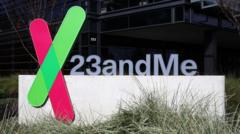Once celebrated for its impactful insights into ancestry and health, 23andMe now fights to maintain viability amid plummeting stock prices and significant concerns over the security of sensitive genetic data.
The Unraveling Future of 23andMe: A DNA Testing Giant on the Edge

The Unraveling Future of 23andMe: A DNA Testing Giant on the Edge
23andMe, once a leading name in DNA testing, faces a potential downfall as it grapples with a dramatic decline in share value and unresolved leadership challenges.
Three years ago, 23andMe was riding high as a revolutionary leader in the DNA testing industry, boasting share prices that eclipsed even tech giants like Apple. Millions clamored to provide saliva samples in exchange for insights into their ancestry, health risks, and genealogical connections. However, the company's fortunes have since plummeted, and it now faces urgent questions about its long-term viability and the safety of its substantial database of genetic information.
This week, 23andMe narrowly averted delisting from the stock market, a stark indicator of its financial instability. The company's share price has fallen dramatically from a high of $321 to a mere $5, signifying a valuation that has shrunk to just 2% of its past worth. As it struggles to turn around its fortunes, multiple concerns arise regarding the sensitive nature of the personal data it has amassed.
In a statement to the BBC, 23andMe has expressed its commitment to safeguarding customer data and maintaining confidentiality. However, experts warn that the company faces a dual crisis; first, it lacks a sustainable business model, and second, ambitions to leverage its DNA database for pharmaceutical research have been slow to materialize into profitability.
Professor Dimitris Andriosopoulos from Strathclyde University suggests this calls into question the firm's likelihood of survival: "If I had a crystal ball, I’d say they will maybe last for a bit longer… but they are highly unlikely to survive."
Leadership turmoil has compounded these issues, with the board of directors resigning last summer, leaving co-founder and CEO Anne Wojcicki, who is also the sister of the late YouTube CEO Susan Wojcicki and the ex-wife of Google co-founder Sergei Brin, as the sole original member. Amid growing speculation that 23andMe may soon be sold or folded, the company has publicly dismissed these claims, asserting Wojcicki’s intention to take the firm private.
Should 23andMe change hands, concerns about the security of the genetic data are paramount. As highlighted by privacy advocate Carissa Veliz, the data collected is inherently sensitive due to its implications for not just individuals but also their families, including those who did not consent to the data sharing. The potential for misuse of DNA data, especially in cases where related individuals have also used the service, raises alarms regarding privacy and ethical data handling.
In their defense, 23andMe has underscored that all data protections governed by law will remain in effect, regardless of potential ownership shifts. Nevertheless, the shadow of a data breach — of which the company was a victim a year prior — looms large, further contributing to the unease voiced by privacy experts.
Veliz maintains that the current terms and conditions under which customers share their data are too permissive, advocating for a stricter regulatory approach to personal data handling. The fate of 23andMe remains uncertain, but the stakes, particularly concerning the handling of sensitive genetic information, are higher than ever.























